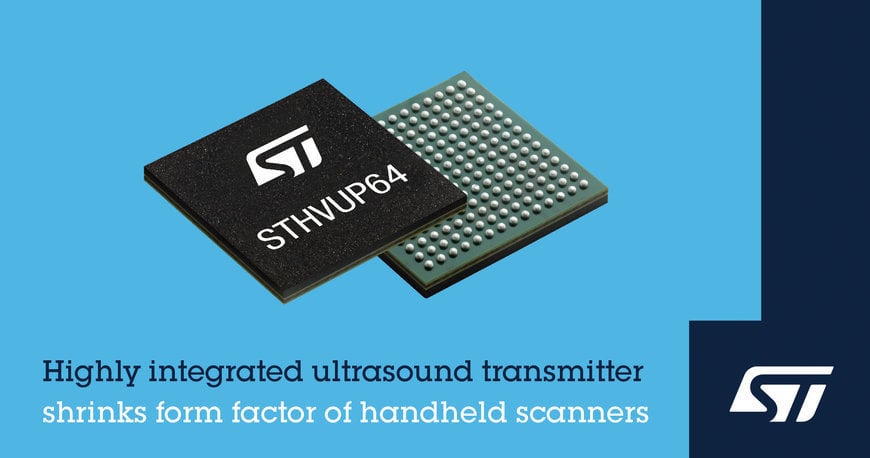www.industry-asia-pacific.com
06
'22
Written on Modified on
Highly integrated ultrasound transmitter from STMicroelectronics boosts image quality and shrinks form factor of handheld scanners
STMicroelectronics has introduced a 64-channel ultrasound transmitter with new features to enhance the image quality and convenience of high-performance portable industrial and medical instruments.

Today’s ultraportable scanners are almost the size of a smartphone yet deliver image quality comparable to large and expensive high-end systems from only a few years ago. ST’s STHVUP64 transmitter, which drives the instrument’s piezoelectric transducers, is powering the next stage in this evolution by adding extra flexibility, digital beam steering, and space-saving innovations.
With 64 channels, the STHVUP64 delivers a highly integrated solution aimed at the handheld, wireless scanner segment. It can drive up to 256 probe elements directly, eliminating expensive, high-voltage switches usually needed between the transmitter and probe. Designers can thus reduce the bill of materials and take advantage of space savings inside the handset.
The STHVUP64 also introduces a new 5-level output capability, in addition to the common 3-level output, which enhances flexibility to optimize the picture quality. High current delivery, up to ±400mA from the STHVUP64, allows driving the transducers at high speed to enable multiple imaging modes. The high drive strength also helps achieve pulse duration as short as 5ns that enhances control of the transducers to maximize image detail. The transmitter supports continuous wave (CW) and pulsed wave (PW) operating modes to allow various types of analysis including cavities and liquid flow.
In addition, digital beam steering enhances directional control by permitting greater precision than conventional analog steering using delay circuits. By integrating the logic on-chip, the transmitter can be used without a companion chip such as an FPGA dedicated to beam steering. This saves PCB space and routing complexity, as well as bypassing FPGA-design challenges.
Also new, the transmitter has a self-biased driver architecture that eliminates any need for the power-supply decoupling capacitors that are typically placed outside the chip. This helps ensure a smaller circuit footprint, as well as lowering the bill of materials (BOM). In addition, it is housed in a smaller package than comparable alternative ICs thereby giving designers greater flexibility to create next-generation products in even smaller form factors.
While having extremely low power consumption, which is key for battery power supply systems, the STHVUP64 is richly featured for a superior user experience. There is on-chip memory for storing transmission patterns, and synchronization is possible using a clock signal up to 200MHz to enhance image quality by minimizing jitter. The IC also provides a communication port that supports multiple CMOS signaling standards, as recommended for today’s highest system-clock signal frequencies.
Built-in protection includes noise blocking, thermal protection, under-voltage protection, and recirculating current protection. There is also a diagnostic register that allows reading the causes of interrupts directly to ease debugging in the event of a malfunction.
The transmitter is built using ST’s proven BCD8s-SOI technology that supports analog (bipolar), digital (CMOS), and power (DMOS) circuits on the same die. It’s in production now, in a 10mm x 10mm x 1.4mm 196-ball FC-BGA196 package, and available from $90.00 for orders of 1,000 pieces.
For more information, please visit www.st.com/ultrasound
www.st.com

